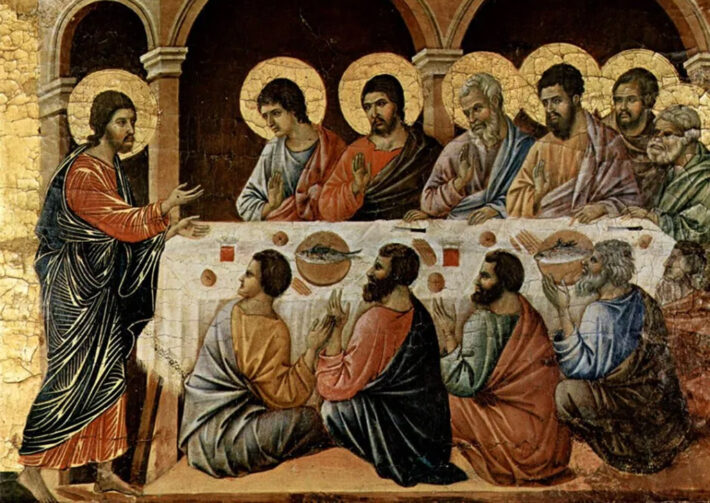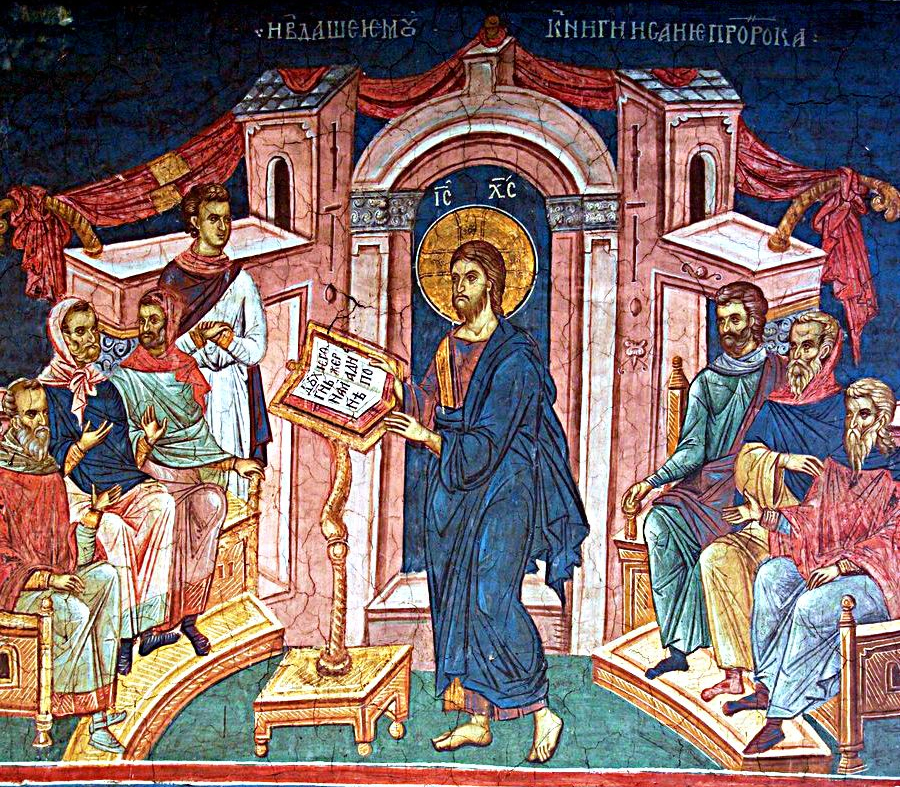Christian Art | Easter To Pentecost | Jesus Bread Of Life
John 6: 35-40 Audio Bible KJV | King James Audio Bible | Daily Verses
35 And Jesus said unto them, I am the bread of life: he that cometh to me shall never hunger; and he that believeth on me shall never thirst.
36 But I said unto you, That ye also have seen me, and believe not.
37 All that the Father giveth me shall come to me; and him that cometh to me I will in no wise cast out.
38 For I came down from heaven, not to do mine own will, but the will of him that sent me.
39 And this is the Father’s will which hath sent me, that of all which he hath given me I should lose nothing, but should raise it up again at the last day.
40 And this is the will of him that sent me, that every one which seeth the Son, and believeth on him, may have everlasting life: and I will raise him up at the last day.
Jesus now gives to us a clear and ready way to salvation. We are to behold the Son of God, to believe in him, and then we shall be saved.
These Bible verses for Easter continue to draw on the great miracle of the loaves and the fishes, when Jesus took a poor boy’s daily ration and fed the five thousand who had gathered to hear his word.
Jesus has led the people who have flocked to see him, and to hear him, to know that their hope must be for that spiritual food which so utterly transcends all bodily sustenance, and indeed exceeds the gift of manna in the desert, as the people followed Moses to the promised land.
Now Jesus reveals himself, telling the people that he is in fact the bread of life which they have longed for. As we believe in Jesus, we shall not hunger, we shall not thirst. All that the Father has given to Jesus, he will transmit to us. Jesus expresses his own great humility in these verses, telling the people that he is come to do his Father’s will. There is in these verses such self-abnegation as Jesus surrenders his whole fate and destiny to his Father’s will. Jesus freely gives himself to the intentions of God the Father. It is because of this that we are enabled to be with the Father, reconciled, through belief in His Son.
Nonetheless, Jesus warns the people: they have seen him, they see him now, and yet they do not believe. The people have flocked to him, and yet this is not through belief in the divinity of Christ, but through the superfice of the signs, the miracles, which he has performed for them – as if, in terms of their awareness, they have but witnessed a theatrical spectacle.
We are now called to a deeper faith. Of course, we approach our Lord knowing all the good works of healing which he performs in our lives each day. And we are called to the greater knowledge, to know Jesus as the Son, through him to reconcile ourselves with the Father, and so through faith to know life eternal.
‘With regard to our first birth we were begotten without our knowledge or consent, by the moist seed when our parents came together; we were born into evil ways and bad habits. But to make us children of choice and understanding instead of compulsion and ignorance, and to obtain for us in the water of forgiveness of our former sins, over anyone who chooses to be born again and who repents of his sins, the name of God the Father and Lord of all is pronounced; and when we lead him to the font to be baptized we pronounce over him no other name.’ St Justin Martyr

![]()
Audio Bible KJV | King James Audio Bible | King James Version | Endnotes
How Does Jesus Being The Bread Of Life Reflect Upon And Develop The Story Of The Exodus?
Jesus says: ‘I am the bread of life: he that cometh to me shall never hunger; and he that believeth on me shall never thirst.’ (John 6:35) This statement echoes the experience of the Israelites in the wilderness, who were sustained by manna from heaven, which God provided to them every day for 40 years (Exodus 16).
The idea of bread as a symbol of sustenance and survival is a theme throughout the Bible, and it is no surprise that Jesus would use this metaphor to describe himself. However, the use of this metaphor goes deeper than just a simple analogy. As theologian John Piper explains: ‘Jesus is not just saying that he is like bread, he is saying that he is bread. That is, he is the source of spiritual life, just as bread is the source of physical life.’ (Desiring God)
In this way, the story of the Exodus becomes a precursor to the coming of Christ, who would become the ultimate source of spiritual nourishment for his followers. The manna in the wilderness sustained the Israelites physically, but Jesus offers spiritual sustenance that goes far beyond the temporary satisfaction of hunger.
The concept of Jesus as the bread of life has been explored by religious authorities throughout history. Saint Thomas Aquinas wrote extensively on the subject: ‘Christ is called the bread of life because he is the author of life, and because he nourishes our souls with his divine teachings, just as bread nourishes our bodies.’ (Summa Theologica)
Protestant reformer Martin Luther also touched on this theme in his writings: ‘The bread that Christ gives is his own flesh, which he gave for the life of the world. Whoever eats of this bread shall live forever.’ (Luther’s Works)
More recently, Catholic priest and theologian Father Robert Barron has spoken on the topic, saying: ‘The Eucharist, which is the Bread of Life, is not just a symbol, but it is actually the body, blood, soul, and divinity of Jesus Christ. This means that when we receive the Eucharist, we are literally consuming Christ, and we are being transformed by his divine life.’ (Word On Fire)
The concept of Jesus as the bread of life reflects upon and develops the story of the Exodus in a profound way. The manna in the wilderness sustained the Israelites physically, but Jesus offers spiritual nourishment that goes far beyond the temporary satisfaction of hunger. Through his teachings and the sacrament of the Eucharist, Christ offers his followers a source of spiritual sustenance that can sustain us for eternity.








